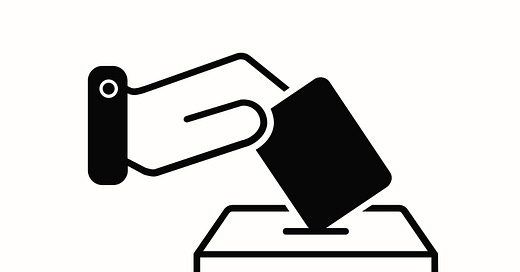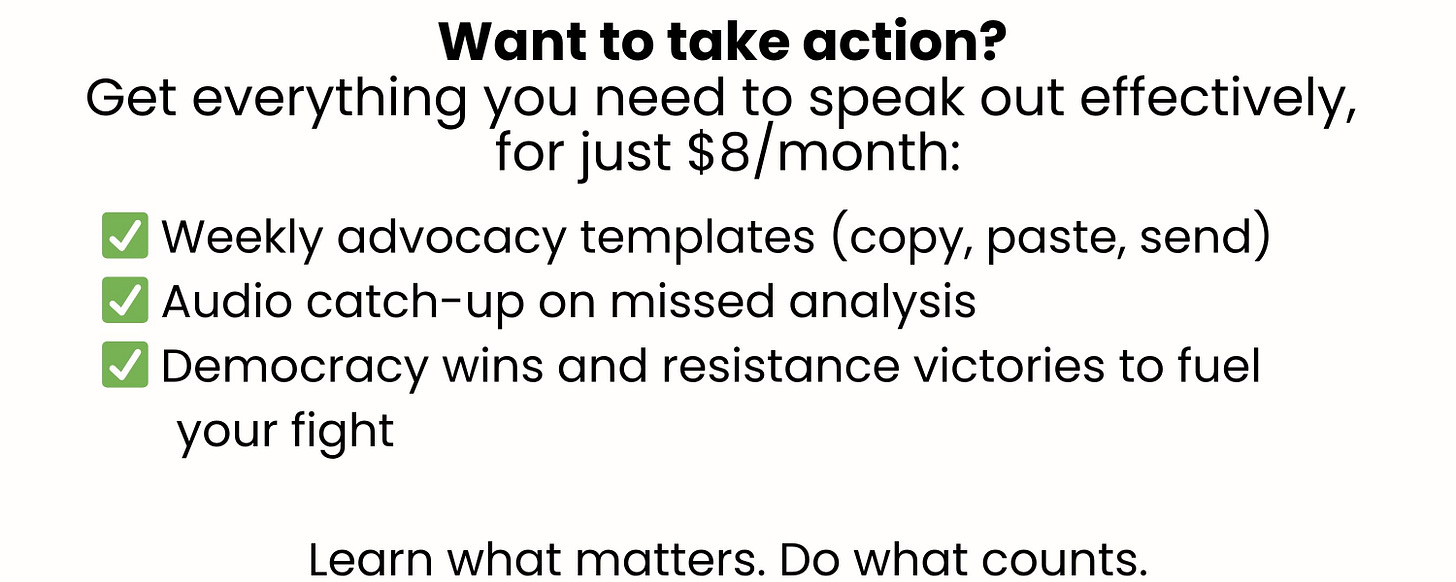The United States Department of Justice is supposed to be America's guardian of fair elections and constitutional order. It prosecutes criminals, defends civil rights, and ensures that even the most powerful people follow the law. But over the past few months, something unprecedented has been happening at the DOJ under Attorney General Pam Bondi that would have shocked previous generations of Americans.
What's Happening
A coordinated assault on America's democratic institutions is unfolding before our eyes, and it's coming from the very agency tasked with protecting them. The Trump administration's Justice Department has embarked on an unprecedented campaign to weaken both judicial independence and voting access—the twin pillars that keep democracy functioning.
The attack on courts reached a shocking crescendo in late June when the DOJ sued every single federal judge in Maryland—all fifteen of them—over a routine court order that temporarily prevents deportations while immigrants challenge their detention.¹ Legal experts say they have never seen the Justice Department sue an entire federal bench in American history.² This extraordinary move followed a whistleblower complaint revealing that senior DOJ officials, including a Trump judicial nominee, had discussed telling federal judges to "f**k you" and simply ignoring court orders they disliked.³
At the same time, the same Justice Department has been systematically targeting the mechanisms that allow people to vote. In North Carolina, they sued state election officials over voter registration records, potentially forcing nearly 100,000 eligible voters to navigate additional bureaucratic hurdles or risk having their ballots rejected.⁴ In Orange County, California, federal prosecutors demanded sensitive personal information about voters, including Social Security numbers and signatures, even after local officials offered to cooperate while protecting voter privacy.⁵
This two-pronged attack on courts and voting rights aligns with the House passing the SAVE Act, legislation that would require every person to present documentary proof of citizenship in person when registering to vote.⁶ The law would eliminate online voter registration, mail-in registration applications, and voter registration drives—effectively ending the convenient methods that millions of people use to participate in democracy.⁷ Married women whose names don't match their birth certificates and people without passports would face particularly steep barriers to exercising their fundamental right to vote.⁸
The assault extends even further through Trump's massive budget legislation, titled the "One Big Beautiful Bill." Buried within its more than 1,000 pages lies a provision that would strip federal courts of their power to hold government officials in contempt for ignoring judicial orders.⁹ The measure would require plaintiffs to post expensive bonds—potentially costing millions or billions of dollars depending on the case—before judges could enforce injunctions against the government.¹⁰ Most concerning, the provision would apply retroactively to existing court orders, potentially allowing the Trump administration to legally ignore the more than 170 judicial rulings that have already blocked various administration actions.¹¹
Together, these actions form a clear pattern: neutralize the courts that could block government overreach, and limit the voters who could hold leaders accountable at the ballot box.
Why This Breaks Democratic Norms
None of this aligns with how American democracy is supposed to work. The Constitution establishes three separate branches of government precisely to prevent any single person or party from accumulating too much power. Courts exist to check executive overreach, and the Justice Department has traditionally respected judicial independence, even when disagreeing with specific rulings.
When government officials lose in court, the normal process is to appeal to higher courts. They don't sue the judges themselves or discuss telling courts to "f**k you." This isn't just about legal procedure—it reflects a fundamental principle that no one, not even the President, is above the law. The Justice Department has historically defended this principle, even when it meant challenging the administration they serve.
Similarly, the DOJ's Civil Rights Division was created to protect voting rights, not to make voting more difficult. For decades, both Republican and Democratic administrations used federal power to ensure that eligible people could participate in elections. The department would investigate voter suppression, not engineer it.
Professional ethics within the Justice Department have long emphasized independence from political pressure. Career attorneys are expected to follow the law and the facts, not partisan directives. Lawyers who make false statements to courts face professional sanctions and potential criminal charges. The system depends on this integrity.
American democratic norms also assume that political parties accept electoral outcomes and work within the system to regain power through persuasion, not by changing the rules about who gets to vote. Throughout our history, the country has generally moved toward expanding democratic participation, not restricting it.
Why This Threatens Everyone
We are witnessing the systematic dismantling of American democracy in real time. This isn't political hyperbole or partisan fearmongering—it's the methodical destruction of the institutional safeguards that have protected our republic for nearly two and a half centuries.
When the Justice Department can sue judges simply for doing their jobs, when government officials openly discuss telling courts to "f**k you," and when Congress passes laws to strip courts of their enforcement power, the rule of law ceases to exist. We become a nation where power, not law, determines what happens next. Every dictatorship in history has followed this playbook: first neutralize the courts, then control who votes.
The voting restrictions aren't about election security—they're about election control. The SAVE Act and DOJ lawsuits will prevent millions of eligible people from participating in democracy, and they're designed to hit hardest against women, communities of color, and working-class voters.¹² This isn't an accident. When you can't win by persuading more people to vote for you, you win by preventing certain people from voting at all.
The immediate consequences are already visible. Election officials face harassment and lawsuits for following the law. Judges confront unprecedented attacks on their independence. Citizens discover that rights they assumed were protected now require navigating bureaucratic mazes designed to discourage participation. The social contract that binds our democracy together—that everyone plays by the same rules and respects the outcomes—is being torn apart.
The long-term damage could be irreversible. Once these precedents are set, they become extremely difficult to undo. Future administrations, regardless of party, will inherit expanded powers to ignore courts and restrict voting. Democracy doesn't die in a single dramatic moment—it's strangled gradually, law by law, norm by norm, until what remains is merely the hollow shell of democratic institutions serving authoritarian ends.
This is how republics fall. Not through military coups or foreign invasion, but through the patient work of those in power systematically eliminating the mechanisms that could remove them from power. We are not watching a typical political dispute—we are watching a fundamental threat to American democracy as we've known it.
Lessons from 'On Tyranny'
Yale historian Timothy Snyder wrote "On Tyranny: Twenty Lessons from the Twentieth Century" as a practical guide for people facing the rise of authoritarianism.¹³ Drawing from the darkest chapters of European history, Snyder identified the warning signs and the small actions that, when taken collectively, can preserve democratic society. His lessons have never been more relevant than they are today.
The current assault on courts and voting rights represents exactly the kind of institutional breakdown that Snyder warned about. When democracies fail, it's rarely because of a single dramatic event—it's because citizens failed to recognize and resist the gradual erosion of democratic norms while resistance was still possible.
Note: Resistance is always guided by Lesson 20: Be as courageous as you can. We are not all positioned to take each of these actions, but consider what you can do given your circumstances. Know that for every action of resistance you take, you are also representing those who cannot stand up due to vulnerability, ability, or means.
Lesson 1: Do not obey in advance. When institutions begin failing, many people reflexively submit to authority before they're even asked to. We see this happening now as election officials preemptively restrict voting access to avoid DOJ lawsuits, and as some judges may hesitate to issue strong orders knowing they'll face unprecedented attacks. Anticipatory obedience normalizes authoritarianism by teaching leaders how far they can push without resistance. How to resist: Register to vote if you haven't already. Help others register to vote. If you're an election worker or government employee, continue following proper procedures despite political pressure. Write letters to local newspapers defending election officials who maintain voting access. Call your representatives to express support for officials upholding their duties.
Lesson 2: Defend institutions. Institutions don't defend themselves—they require active protection from citizens who understand their value. The courts, election systems, and civil service are under direct assault right now, and they need defenders. When institutions are weakened or captured, they become tools of authoritarian control rather than democratic governance.
How to resist: Call your senators to oppose the SAVE Act and any legislation weakening judicial power. Sign up to be a poll worker or election observer. Attend city council and school board meetings to speak up for fair elections. Join organizations like the League of Women Voters. Show up at public hearings on voting laws. Write op-eds for local papers about the importance of voting access.
Lesson 5: Remember professional ethics. Lawyers, judges, election officials, and civil servants all took oaths to uphold the law and constitution, not to serve partisan interests. When professionals abandon their ethical obligations to serve power instead of principle, institutions collapse from within. We're seeing this tested as DOJ lawyers are pressured to make false statements to courts and election officials face demands to restrict access illegally. The whistleblower who exposed the "f**k you" comments lost his job for refusing to make false statements—he chose professional ethics over personal security.
How to resist: If you work in government, law, or elections, document any pressure to violate your professional duties and report it to appropriate oversight bodies. Know your whistleblower protections. If you're a citizen, write thank-you notes to election officials doing their jobs properly. Attend bar association meetings to advocate for professional standards. Contact professional licensing boards when you see ethical violations.
Lesson 10: Believe in truth. Democracy depends on a shared commitment to factual reality. When truth becomes partisan—when basic facts about vote counts, court orders, and legal procedures are disputed based on political loyalty—democratic discourse becomes impossible. The attacks we're witnessing are being justified through false claims about widespread voter fraud and "activist judges," despite overwhelming evidence to the contrary.
How to resist: Subscribe to and financially support local newspapers and nonprofit journalism. Fact-check claims before sharing them on social media. Correct misinformation when you see it, using reliable sources. Refuse to share posts that make false claims about elections, even if you agree with their general message. Ask for sources when people make claims about voter fraud or judicial corruption.
Lesson 15: Contribute to good causes. Democratic institutions and civil liberties organizations need financial resources to fight back against authoritarian attacks. Court cases challenging voting restrictions and defending judicial independence are expensive and time-consuming. Legal organizations are fighting multiple battles simultaneously while facing well-funded opposition. The groups defending democracy today need money to hire lawyers, fund litigation, and sustain their operations during this critical period.
How to resist: Set up monthly donations to the ACLU, Brennan Center for Justice, or Common Cause. Donate to your local voter protection organizations. Give money to candidates who support voting rights and judicial independence. Contribute to legal defense funds for election workers facing harassment. Make democracy defense a line item in your monthly budget.
Final Thoughts
The systematic assault on courts and voting rights we're witnessing represents the most serious threat to American democracy in our lifetimes. When the Justice Department sues judges and Congress strips courts of enforcement power while simultaneously making it harder for millions to vote, we're watching the real-time dismantling of the checks and balances that protect us all.
Choose one action from the lists above and start today. Your participation matters more than you know, and the window for peaceful resistance is closing fast.
We read 1,100-page bills so you don't have to. We track 170+ court cases. We analyze constitutional law. We create action tools. $8/month.
We the People Hold the Power– Protest Gear for All Humans
Because they work for us. Not the other way around.
Forgot who's really in charge? This supersoft, unisex t-shirt serves as a powerful reminder with the bold declaration "We the People Hold the Power"—a statement that cuts through political spin and gets straight to the constitutional truth.
Made for people who understand that elected officials are public servants, not rulers. For those who know that real power flows from the ground up, not the top down. Whether you're at a city council meeting, voter registration drive, or just reminding everyone at the coffee shop how democracy actually works, this shirt delivers the message with radical clarity.
This t-shirt is everything you've dreamed of and more. It feels soft and lightweight, with the right amount of stretch. It's comfortable and flattering for all.
Perfect For:
Civic activists who show up and speak up
Voters who know their voice matters
People who hold politicians accountable
Anyone tired of being told to sit down and shut up
Every shirt helps fuel strong coffee, stronger Wi-Fi, and a movement that knows staying loud and staying kind is how we win.
Sources
NPR. "Trump administration sues all of Maryland's federal judges over deportation order." June 26, 2025. https://www.npr.org/2025/06/26/nx-s1-5445843/justice-department-maryland-judges-deportation
Reuters. "Trump administration sues Maryland federal judges over order blocking deportations." June 25, 2025. https://www.reuters.com/legal/government/trump-administration-sues-maryland-federal-judges-over-order-blocking-2025-06-25/
CNN Politics. "Top Justice Department leaders and judicial nominee tried to mislead judges, whistleblower says." June 24, 2025. https://www.cnn.com/2025/06/24/politics/justice-department-whistleblower-deportation-emil-bove
Democracy Docket. "Around 98,000 Voters Risk Disenfranchisement Under New North Carolina Plan." June 24, 2025. https://www.democracydocket.com/news-alerts/around-98000-voters-risk-disenfranchisement-under-new-north-carolina-plan/
Democracy Docket. "DOJ Cuts Off Negotiations, Sues Orange County, CA Over Voter Records." June 25, 2025. https://www.democracydocket.com/news-alerts/doj-cuts-off-negotiations-sues-orange-county-ca-over-voter-records/
AP News. "House passes SAVE Act, bill requiring proof of citizenship for voting." April 11, 2025. https://apnews.com/article/congress-save-act-citizenship-voting-elections-a37c139461d11eb5f82086680b67ffe7
Center for American Progress. "The SAVE Act: Overview and Facts." January 31, 2025. https://www.americanprogress.org/article/the-save-act-overview-and-facts/
NPR. "Will the SAVE Act make it harder for married women to vote? We ask legal experts." April 13, 2025. https://www.npr.org/2025/04/13/g-s1-59684/save-act-married-women-vote-rights-explained
Reuters. "Trump's sweeping tax-cut bill includes provision to weaken court powers." May 30, 2025. https://www.reuters.com/world/us/trumps-sweeping-tax-cut-bill-includes-provision-weaken-court-powers-2025-05-30/
Campaign Legal Center. "These Hidden Provisions in the Budget Bill Undermine Our Democracy." https://campaignlegal.org/update/these-hidden-provisions-budget-bill-undermine-our-democracy
Christian Science Monitor. "Hidden provision in Trump's 'big bill' could weaken judicial..." May 28, 2025. https://www.csmonitor.com/USA/Justice/2025/0528/congress-court-contempt-big-beautiful-bill
Center for American Progress. "The SAVE Act Would Disenfranchise Millions of Citizens." March 28, 2025. https://www.americanprogress.org/article/the-save-act-would-disenfranchise-millions-of-citizens/
Snyder, Timothy. On Tyranny: Twenty Lessons from the Twentieth Century. Tim Duggan Books, 2017.
Democracy Docket. "We heard your feedback and added an audio version of this premium newsletter!" June 28, 2025. Newsletter by Marc Elias.






